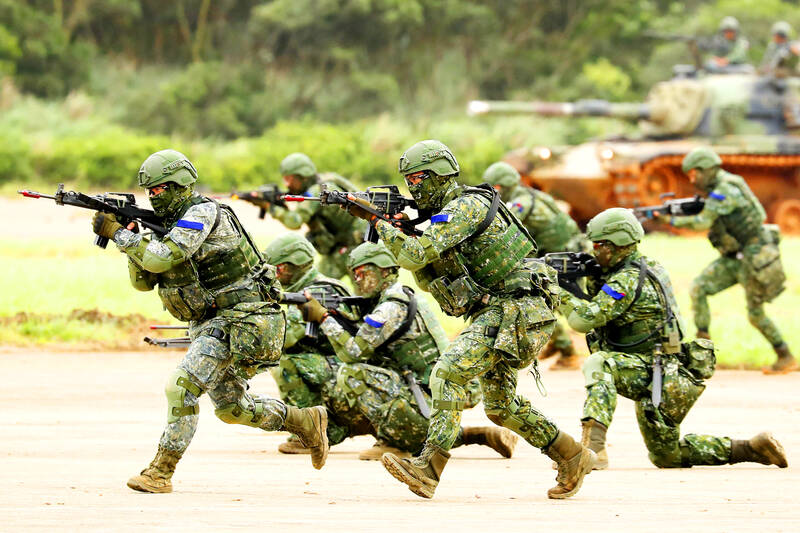The Ministry of National Defense should work to forecast developments in modern warfare before revising military training programs, a military expert said, as a plan to extend conscription is expected to be finalized by President Tsai Ing-wen (蔡英文) this week.
The ministry has been deliberating whether to extend conscription to one year from four months in response to increasing Chinese military threats, but it has so far not announced any details of the plan.
Institute for National Defense and Security Research postdoctoral researcher Hsu Chih-hsiang (許智翔) on Saturday said that Taiwan’s armed forces have recently updated their weaponry and equipment, adding that infantry training schedules have also been updated.

Photo: Ritchie B. Tongo, EPA-EFE
Rifle-firing exercises now also include shooting in kneeling and standing positions, in addition to shooting in prone position, he said.
New conscripts fire more bullets during training than previously conscripted service members, he added.
However, the number of bullets fired should be further increased, as “it takes a lot of practice to gain specialization,” he said.
The focus of conscript training is on infantry skills, resulting in a lack of other skills among reserve forces, he said, adding that specialization requires more extensive small-unit training.
Retired army general Richard Hu (胡瑞舟) said that “traditional training does not have to be in contradiction with modern training.”
Bayonet drills are often seen as outdated, but the US Army used bayonets in the wars in Afghanistan and Iraq to fight at close quarters, said Hu, who is deputy director of National Chengchi University’s Taiwan Center for Security Studies.
The time allotted for each exercise is most important, he said, adding that the focus should be on thorough training instead of assigning conscripts to do chores.
Hsu echoed the retired general in his assessment.
Urban warfare is a crucial part of defense strategies, Hsu said, adding that it is necessary to draw up training materials that focus on rifle-firing, hand-to-hand combat techniques and practical bayonet skills.
After conscripts are discharged, weapon training and small-unit tactical training should be the focus of regular exercises, he said.
“Agile small units are of utmost importance,” as such units might need to operate largely independently in wartime, when effective top-down communication might not always be possible, he said.
When there are multiple lines of operation on a battlefield, units have to be agile enough to carry out military actions, he said.
Aside from concrete exercises, “the core question is what is the armed forces’ vision of the future battlefield,” Hsu said, adding that training programs and equipment procurement should based on that vision.
The ministry should pay attention to developments in modern warfare, Hsu said.
For example, Taiwan can learn lessons from Ukraine’s efforts to defend itself amid the ongoing Russian invasion, he said.
Taiwan should adopt tactics that are successfully used by Ukrainian forces, Hsu added.
The ministry’s two most recent defense reports did not reflect trends in modern warfare and how to defend against an enemy deploying such tactics, he said.
Taiwan should improve its approach in a timely manner, as it would otherwise be in an extremely disadvantageous position if it is attacked, he added.

Taipei has once again made it to the top 100 in Oxford Economics’ Global Cities Index 2025 report, moving up five places from last year to 60. The annual index, which was published last month, evaluated 1,000 of the most populated metropolises based on five indices — economics, human capital, quality of life, environment and governance. New York maintained its top spot this year, placing first in the economics index thanks to the strength of its vibrant financial industry and economic stability. Taipei ranked 263rd in economics, 44th in human capital, 15th in quality of life, 284th for environment and 75th in governance,

The Sports Administration yesterday demanded an apology from the national table tennis association for barring 17-year-old Yeh Yi-tian (葉伊恬) from competing in the upcoming World Table Tennis (WTT) United States Smash tournament in Las Vegas this July. The sports agency said in a statement that the Chinese Taipei Table Tennis Association (CTTTA) must explain to the public why it withdrew Yeh from the WTT tournament in Las Vegas. The sports agency said it contacted the association to express its disapproval of the decision-making process after receiving a complaint from Yeh’s coach, Chuang

Control Yuan Secretary-General Lee Chun-yi (李俊俋) tendered his resignation last night, admitting that he had misused a government vehicle, as reported by media. His resignation was immediately accepted by the Control Yuan. In a statement explaining why he had resigned, Lee apologized for using a Control Yuan vehicle to transport his dog to a pet grooming salon on May 20. The issue first came to light late last month, when TVBS News reported that Lee had instructed his driver to take the dog to the salon. The news channel broadcast photos that it said were taken by an unnamed whistle-blower, which purportedly showed the

A former officer in China’s People’s Liberation Army (PLA) who witnessed the aftermath of the 1989 Tiananmen Square massacre has warned that Taiwan could face a similar fate if China attempts to unify the country by force. Li Xiaoming (李曉明), who was deployed to Beijing as a junior officer during the crackdown, said Taiwanese people should study the massacre carefully, because it offers a glimpse of what Beijing is willing to do to suppress dissent. “What happened in Tiananmen Square could happen in Taiwan too,” Li told CNA in a May 22 interview, ahead of the massacre’s 36th anniversary. “If Taiwanese students or